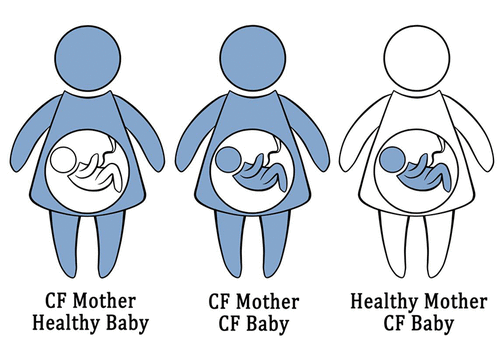当前位置:
X-MOL 学术
›
ACS Pharmacol. Transl. Sci.
›
论文详情
Our official English website, www.x-mol.net, welcomes your
feedback! (Note: you will need to create a separate account there.)
The Balance between the Safety of Mother, Fetus, and Newborn Undergoing Cystic Fibrosis Transmembrane Conductance Regulator Treatments during Pregnancy
ACS Pharmacology & Translational Science ( IF 4.9 ) Pub Date : 2020-08-19 , DOI: 10.1021/acsptsci.0c00098 Fiona Qiu 1 , Mark Habgood 1 , Elena K Schneider-Futschik 1
ACS Pharmacology & Translational Science ( IF 4.9 ) Pub Date : 2020-08-19 , DOI: 10.1021/acsptsci.0c00098 Fiona Qiu 1 , Mark Habgood 1 , Elena K Schneider-Futschik 1
Affiliation

|
The recent development of modulators of cystic fibrosis transmembrane conductance regulator (CFTR) has allowed the life expectancy of cystic fibrosis patients to increase substantially resulting in more women with cystic fibrosis reaching child-bearing age. This however raises the issue of whether long-term use of CFTR modulators during pregnancy and breastfeeding is safe for the fetus and newborn, especially for their developing brain. A very limited number of case reports available so far has shown that the fetus or breastfed newborn is likely to be exposed to maternally administered CFTR modulators. Potential impacts of drug exposure on the developing brain are of particular importance as the consequences might not be immediately noticeable upon birth but may manifest later in life as permanent neurobehavioral problems. In order for drugs in maternal circulation to enter the fetal brain, they must overcome the placental barrier followed by a series of brain barriers, each consisting of cellular components and physiological mechanisms such as efflux transporters. The extent of protection they offer during development will provide valuable insights into the potential entry and the effects of CFTR modulators in the developing brain. This review aims to explore the current understanding of the safety of CFTR modulators, especially ivacaftor, during pregnancy and breastfeeding, characterize the pharmacokinetics and pharmacodynamics of ivacaftor, both under normal conditions and during pregnancy, to provide context for its potential impact on the developing brain. Finally, we discuss the determinants that need to be taken into consideration when investigating the entry of drugs into the fetus and newborn.
中文翻译:

孕期接受囊性纤维化跨膜电导调节器治疗的母亲、胎儿和新生儿的安全性之间的平衡
囊性纤维化跨膜电导调节剂 (CFTR) 调节剂的最新发展使囊性纤维化患者的预期寿命大幅增加,导致更多囊性纤维化女性达到生育年龄。然而,这引发了一个问题,即在怀孕和哺乳期间长期使用 CFTR 调节剂对胎儿和新生儿是否安全,尤其是对他们发育中的大脑是否安全。迄今为止,可用的病例报告数量非常有限,表明胎儿或母乳喂养的新生儿可能会接触到母体施用的 CFTR 调节剂。药物暴露对发育中的大脑的潜在影响尤其重要,因为其后果可能不会在出生时立即引起注意,但可能在以后的生活中表现为永久性的神经行为问题。为了让母体循环中的药物进入胎儿大脑,它们必须克服胎盘屏障,然后是一系列脑屏障,每个屏障由细胞成分和外排转运蛋白等生理机制组成。它们在发育过程中提供的保护程度将为 CFTR 调节剂在发育中的大脑中的潜在进入和影响提供有价值的见解。本综述旨在探讨目前对 CFTR 调节剂(尤其是依伐卡托)在怀孕和哺乳期间的安全性的理解,描述依伐卡托在正常条件下和怀孕期间的药代动力学和药效学特征,为其对发育中的大脑的潜在影响提供背景. 最后,
更新日期:2020-10-11
中文翻译:

孕期接受囊性纤维化跨膜电导调节器治疗的母亲、胎儿和新生儿的安全性之间的平衡
囊性纤维化跨膜电导调节剂 (CFTR) 调节剂的最新发展使囊性纤维化患者的预期寿命大幅增加,导致更多囊性纤维化女性达到生育年龄。然而,这引发了一个问题,即在怀孕和哺乳期间长期使用 CFTR 调节剂对胎儿和新生儿是否安全,尤其是对他们发育中的大脑是否安全。迄今为止,可用的病例报告数量非常有限,表明胎儿或母乳喂养的新生儿可能会接触到母体施用的 CFTR 调节剂。药物暴露对发育中的大脑的潜在影响尤其重要,因为其后果可能不会在出生时立即引起注意,但可能在以后的生活中表现为永久性的神经行为问题。为了让母体循环中的药物进入胎儿大脑,它们必须克服胎盘屏障,然后是一系列脑屏障,每个屏障由细胞成分和外排转运蛋白等生理机制组成。它们在发育过程中提供的保护程度将为 CFTR 调节剂在发育中的大脑中的潜在进入和影响提供有价值的见解。本综述旨在探讨目前对 CFTR 调节剂(尤其是依伐卡托)在怀孕和哺乳期间的安全性的理解,描述依伐卡托在正常条件下和怀孕期间的药代动力学和药效学特征,为其对发育中的大脑的潜在影响提供背景. 最后,











































 京公网安备 11010802027423号
京公网安备 11010802027423号